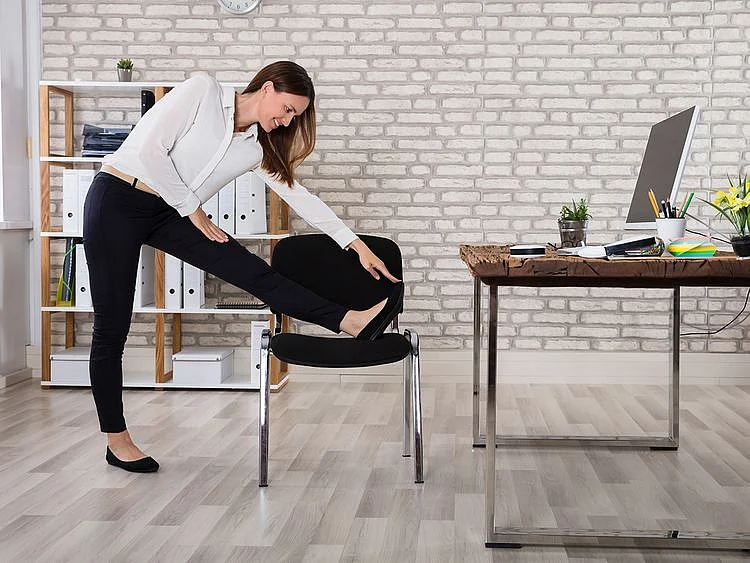If you have been patting your back for getting in your daily dose of exercise, that’s a great start but you also need to keep an eye on your daily movement and activity for optimal health. Weight loss can actually become incidental if, in addition to regular exercise, you eat healthy and if you adopt non-exercise activity thermogenesis (NEAT).
What is NEAT?
Imagine it’s a Friday and you have woken up bright and early to get your one hour of workout in, then you head home and go into hibernation watching Netflix for the rest of the day.
Despite working out, you wonder how you are not shedding the pounds. Well, there are two main reasons according to Dr Manoj Kumar Nair, Physical Medicine and Rehabilitation Specialist at the Dubai Physiotherapy and Rehabilitation Centre.
Firstly, what did you eat after the workout? It is important to count calories even if the food is healthy so that you can maintain your calories to avoid weight gain or aim for a calorie deficit by the end of the day if you intend to lose weight.
Dr Nair says, “It is important to bear in mind that not all calories are equal so while you definitely need to think of calories as sometimes healthy food options can be too high in calories. It’s also important to think of where the calories are coming from. For example, 100 calories from an apple is better for you than 100 calories from chips and the apple will keep you fuller for longer.
“You can enjoy these foods but bear in mind that it should be made without additional sugars and you need to eat sensibly for the rest of the day so that you don’t exceed your calorie intake. Basically, one hour of workout does not compensate for eating all you can during the rest of the day.”
Secondly, what you have not taken into consideration is the lack of mobility after your workout session - you are missing out on NEAT.
Why is NEAT so important?
Activity thermogenesis can be broken up into two categories: Exercise activity thermogenesis and non-exercise activity thermogenesis (NEAT). Dr Nair says, “NEAT is the energy expended for everything we do when we’re not sleeping or exercising (hence the “non-exercise”).
“Taking a flight of stairs, walking from the parking lot to the office or a grocery store and cooking or cleaning are all forms of NEAT and the good news is they all burn calories, and more than we would expect. Studies have shown that NEAT can burn around an extra 350 Kcal/day if properly executed. This is equivalent to running 5km a day at a pace of 10km/hr.
However, he warns that before you think you can skip your daily workout, remember – both exercise and non-exercise activity thermogenesis are important. “You can’t skip either and you need to track your food as well as get enough sleep.”
Further explaining how the concept of NEAT works, Dr Nair says, “Our jobs, especially if we have desk jobs, impact our levels of NEAT greatly. Anyone working in an occupation that requires you to be on your feet, such as nurses, moving about or engaging in any physical activity – would have high levels of NEAT. However, for those who are mainly working on desk jobs the level of NEAT will be very low.”
The good news is there are certainly ways to increase NEAT even when working in a sedentary occupation. “You need to consciously up your NEAT activity because compared to a desk job anyone with a more active job will burn a lot more calories than you would. Take the stairs when possible, take regular breaks from your desk job and do a quick walk around as well as get some stretches in to prevent posture and muscle problems. Park your vehicle as far as possible from the entrance.
Once home, after you take a break, try to stay active with home chores. On the days you are unable to get exercise, remember even 15 minutes make a difference.
“While resting during the weekend is important, do not let the weekends go by without sufficient movement,” says Dr Nair. “These few things might feel overwhelming but once you make it a habit, it becomes a way of life and then weight loss becomes incidental. I always tell my clients to focus on health and well-being by adopting right daily practices. In a nutshell, every step counts.”
10 points for optimal health and well-being
1. Get regular yearly health check-ups
2. Medication compliance and regular follow-ups
3. Healthy foods can be high in calories so consider the total calories you consume per day
4. No fad diets or skipping meals
5. Exercise regularly at least 30 minutes five times a week
6. NEAT: Make sure you are moving enough per day
7. Take a five-minute break after every hour of work to stretch your muscles.
8. Sleep schedule: Set a proper sleep schedule and get at least 7 hours of sleep per night
9. Stay active during weekends
10. Meditate or practice mindfulness activities such as yoga, long walks on the beach and spend time in nature to manage stress levels.
Source: Dubai Physiotherapy and Rehabilitation Centre
Sign up for the Daily Briefing
Get the latest news and updates straight to your inbox
Network Links
GN StoreDownload our app
© Al Nisr Publishing LLC 2026. All rights reserved.
